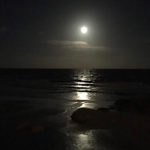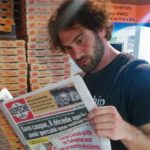An unorthodox tour of the second and final tomb of Lazarus puts a strange twist into our correspondent’s Larnaca layover.
By Rolf Potts
Perhaps I never would have met the Iranian had it not been for the influenza epidemic raging across Europe at the time. Because of the flu, Larnaca — a holiday beach town on the southern coast of Cyprus — was nearly empty of tourists. I was walking along the deserted beachfront promenade when a lone man in coveralls approached me.
“I am from Iran,” he said. “I think you are not from Cyprus.”
I smiled at both the man’s abrupt introduction and his unusual appearance. He looked like he’d just come in from bow-hunting deer in Idaho: dark-green coveralls, heavy boots, a bright orange stocking cap. He wore thick glasses and looked to be about 40 years old.
“Yes, I’m not from Cyprus,” I told him. “I’m from America.”
“America!” the man exclaimed. “I have an American nickname: Harrison. Like Harrison Ford. I made up this name because I like Harrison Ford, and I love America. In my mind, I think that America must be like Paradise. Is it wonderful to live there?”
“Well I wouldn’t call it Paradise, but I like living there.”
“I wish I could go to America, but I cannot get a visa. So last week I came here to Cyprus instead.”
“Vacation?”
The Iranian scoffed. “For me, there is no vacation. I come here to fix satellites.”
“Satellites?”
“Yes, that is my work. The police in Iran don’t like satellites, so I have to come to Cyprus. There are many satellites in Larnaca.”
Since I was quite certain Cyprus didn’t have a space program, I decided to clarify. “What kind of satellites?”
“Satellites!” Harrison exclaimed. He pointed skyward and waved his hands around. “In Iran, the police say they are bad for women, so I have no work.”
“How are satellites bad for women?”
“With a satellite, women can see too many things. They can see Dallas.”
“Dallas?”
“Dallas! Julia Roberts! CNN! The police think women will forget their duty to Islam.”
“Oh, right. You fix satellite dishes.”
“And many other electronics. But Iran is not a good place for me to live or work. I hope Cyprus is better. Tell me, did you come to Larnaca for living?”
“No, I’m just here for a visit.”
“A tourist! You come for the beach, or to see Lazarus?”
“What’s Lazarus?”
“Lazarus. He was friends with Jesus. His tomb is here. Don’t you read the
Bible?”
“Of course, but I’m pretty sure his tomb should be in Israel. And it should be empty, since the story is that Jesus raised him from the dead.”
“Yes, but after Jesus gave him life, Lazarus decided to come to Cyprus. If you wish, I can show you where is his tomb.”
“Sure,” I shrugged. “Let’s see it.”
As I followed the stocking-capped Iranian away from the beachfront, I couldn’t help chuckling at the thought of Lazarus choosing to come to Cyprus (of all places) after his resurrection. I kept getting this mental image of a post-miracle press event at the open tomb in Bethany, with reporters shoving in to ask questions. “Lazarus,” I imagined them saying, “Jesus just raised you from the dead after four days in the tomb — what’ll you do now?” And instead of Disneyland, Lazarus tells them he’s going to Larnaca.
“Why do you smile?” Harrison asked me as we went down the winding back streets of Larnaca in search of the tomb.
“I’m just wondering why Lazarus came to Cyprus,” I said. “I’m wondering what he did when he got here.”
The Iranian shrugged. “He died again, I think.”
– – – – – – – – – – – – – – – – – – – –
Lazarus or no Lazarus, I had never planned on going to the Mediterranean island of Cyprus in the first place. Originally, my plan had been to find a direct flight from Rome to Cairo. I’d soon discovered, however, that Cyprus Air offered passage to Cairo at less than half the cost of other airlines. The only catch was a 24-hour layover in Larnaca. Always a sucker for cheap airfare, I went for it.
The drawback to this was that I arrived in Cyprus without any idea of what I could see or do there. The tourist authority at the Larnaca airport gave me a stack of brochures, but it seemed self-defeating to spend much time studying them when I had only a day in the country. When I’d skimmed over the parts about how Larnaca featured the St. Lazarus Church, it never occurred to me that Lazarus himself might be there. The Iranian who called himself Harrison set me straight.
“Do you believe in Lazarus?” he asked as we made our way to the tomb.
“Well, I don’t really believe he was raised from the dead after four days,” I said.
“But his bones are here in Larnaca! Don’t you believe in the Christian God?”
“I believe in God, but I also believe in a healthy dose of skepticism.”
“What is ‘skepticism’?”
“Skepticism is like doubt. A skeptic is someone who doesn’t believe very easily. That’s me.”
“Do you believe in artificial blood?”
This question threw me a bit. “Artificial blood? Like in the movies?”
“No, in real life. The blood that people use.”
“I don’t think I know about that.”
“It comes from America, and doctors use it. I read this in a magazine, and it sounded crazy. Still, I am not a skeptic. I think it is real. I want to see it and know what color it is. I want to know how it is made. Do you know where I might see some?”
“Actually, this is the first I’ve heard of anything like artificial blood.”
“You are a skeptic.”
I laughed. “Or maybe just ignorant.”
Harrison reached out and took me lightly by the arm. “Do you know how to get a visa to America?” he said in a quiet voice.
“Not really,” I said. “I’m from America, so of course I don’t need a visa to go there. Why do you want one — you want to see artificial blood that badly?”
“Iran is a bad place,” he said, ignoring my clumsy joke. “There was some hope before, but things are getting bad. The elections will make things worse. I don’t want to go back; I want to leave.”
“What about Cyprus? Aren’t you going to stay here?”
“My visa is only for three months. But while I am here, I want to get an American visa. Can’t you help me?”
“I’d like to, but I don’t know anything about the visa process. Especially for Iranians.”
“Can you write down for me your name and address in America? Maybe it would help if I had an American friend.”
“I don’t think having an address will make a difference. Especially the address of someone you just met in the street.”
Harrison looked a bit hurt by this comment. “But I think we are already friends,” he insisted.
– – – – – – – – – – – – – – – – – – – –
St. Lazarus Church is a sturdy stone structure in a clean courtyard not far from the old Larnaca Fort. Harrison waited outside as I entered to discover a narrow maze of wooden pews, vaulted ceilings and curving stone-block columns. Ornate chandeliers hung from the stone arches, and an intricate gilded iconostation dominated the front of the church. Byzantine saints with golden halos peeked out from every wall and corner. A painted wooden altar in the middle of the church contained a silver crucifix and large glass disc fastened down with a ruby-studded rim. Beneath the glass was the yellowed crown of a human skull.
According to church tradition, Lazarus went to Cyprus in about A.D. 33 to escape persecution at the hands of the Jews in Bethany. He settled in Larnaca (then called Kition) and was consecrated as the first bishop of Kition by the Apostles Paul and Barnabas. During his time in Cyprus, Lazarus never smiled save on one occasion, when he saw someone stealing a pot and said, “The clay steals the clay.” His melancholy demeanor was said to be a result of the four days his soul spent in Hades before Jesus raised him from the dead. He died for the second and final time in A.D. 63, and the present stone church was built on the site of his tomb in the late ninth century.
“Yes,” I said. “It was very interesting.”
“Do you believe in Lazarus now?”
“No, I’m afraid I’m still a skeptic when it comes to Lazarus.”
“I am not a skeptic. I believe in Lazarus.”
“Are you a Christian?”
“Of course not!” he laughed. “I am a Muslim.”
“Do Muslims believe in the miracle of Lazarus?”
“The Koran does not speak of Lazarus. But the Koran does say that Jesus could do miracles. I think it is bad to be a skeptic. I think you should believe.”
“A skeptic believes in many things, but he also doubts. All I’m saying is that I doubt the miracle of Lazarus.”
“But how can you doubt miracles if you believe in God?”
“God is God — I just don’t believe he deals much in miracles. I don’t much believe in believers, either. That’s how skepticism works.”
Harrison nodded solemnly. “There are too many believers in Iran. I think I am a skeptic sometimes, too.” He paused for a moment, then went on. “Do you think I am a good man?”
“Sure, I think so.”
“Then can you please give me your address for an American visa?”
“I don’t think my address will make a difference on your visa.”
“But will you give it to me?”
For some reason, I didn’t want to encourage what seemed like a doomed enterprise. “It will take a lot more than my address to get you to America.”
“But will you give it to me?”
I gave Harrison a hesitant stare, still not comfortable at being the object of such blind hope. “OK,” I said finally. “Give me some paper.”
Harrison unzipped his coveralls and took out a small, dogeared notebook. “If anybody asks, you must tell them I am your friend.”
“I think I can do that,” I said. I took the notebook and wrote down my American address — touched by Harrison’s desperate sense of optimism, but still skeptical at his odds for a new life.
When I’d finished, Harrison thanked me profusely and made vague plans to meet me that evening. After he’d gone, I stuck around the courtyard to stroll through the Byzantine museum and examine the marble graves in the adjacent Protestant merchant cemetery.
Before I went back to the waterfront, however, I returned to the St. Lazarus sanctuary to get one more look at what may or may not have been the bones of a man who may or may not have been raised from the dead.
This essay originally appeared in Salon on February 22, 2000.





